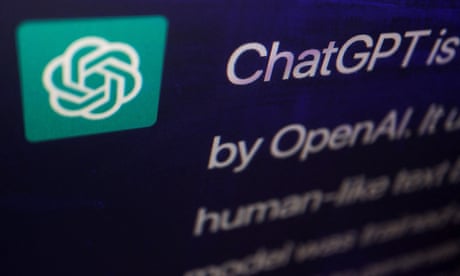- by foxnews
- 03 Feb 2025
‘Political propaganda’: China clamps down on access to ChatGPT
‘Political propaganda’: China clamps down on access to ChatGPT
- by theguardian
- 27 Feb 2023
- in technology

Chinese regulators have reportedly clamped down on access to ChatGPT, as Chinese tech firms and universities push forward with developing domestic artificial intelligence bots.
ChatGPT, the popular discussion bot created by US-based OpenAI, is not officially available in China, where the government operates a comprehensive firewall and strict internet censorship. But many had been accessing it via VPNs, and some third-party developers had produced programs that gave some access to the service.
Those programs have disappeared from WeChat accounts. Multiple reports have said that major tech firms including WeChat's parent company, Tencent, and Ant Group, have been ordered to cut access to the programs. Earlier this week, state media had expounded on the dangers of ChatGPT as a potential tool for the US to "spread false information". A China Daily article said that questions put to ChatGPT about Xinjiang always returned answers "consistent with the political propaganda of the US government that there is so-called 'genocide'."
The Chinese government has been found to have committed mass human rights violations in Xinjiang, which it denies.
Searches for ChatGPT on Chinese platforms no longer returned results, while workaround programs had been disabled or replaced with a notice saying they had been suspended for "violating relevant laws and regulations", the South China Morning Post reported.
Tencent did not answer requests for comment.
Dr Ilaria Carrozza, a senior researcher at the Peace Research Institute Oslo, said the crackdown was not surprising.
"OpenAI didn't allow people in China to register, so there were some barriers, but it wasn't fully blocked," she said.
"The model is trained on open information based in western countries. Potentially it raises a lot of issues [for the Chinese government], because people could have used it to raise questions about sensitive topics, like human rights abuses in Xinjiang, Taiwan, the Diaoyu islands."
There had been widespread interest in ChatGPT, which added fuel to a tech race in China's industry to create domestic chatbots. Chinese social and state media have been awash with reports of tests of the technology and discussions of its use in academic and other settings.
Plato, a chatbot released by Baidu in 2021, drew unfavourable comparisons on social media after it failed to match up to the new US-created entrant, according to a translation by ChinaTalk. In one widely shared example, Plato became fixated on saying "3+5=5", while a ChatGPT-scripted fake government notice announcing the end of anti-congestion traffic regulations caught many people out in Hangzhou.
A viral article in the Jiemian business news outlet said there were two major challenges for Chinese AI developers: "Paltry training materials and toxic competition in the technology industry."
"Baidu's Plato seems possessed by a low-class internet troll; there is truth to the popular online joke that it was trained on the Weibo comment section," the article said, according to ChinaTalk.
With ChatGPT access now cut off for Chinese consumers, and no equivalent domestic replacement, there is now an unanswered demand in China. The industry is still reeling from two years of heavy regulatory interventions.
"They face a dilemma - they want to [reassure] investors and consumers that they're developing as fast as other tech companies in the world, but they also don't want to upset the government," said Carrozza. "It's quite difficult for these companies to navigate these environments and propose products that aren't going to be immediately shut down."
Baidu, Alibaba, JD.com and Tencent are among dozens of firms and universities to have announced plans for AI chatbots. Baidu's program, named Ernie Bot, is considered to be the most advanced in development, with a launch expected in March.
The Baidu CEO, Robin Li, told reporters this week the company had spent years developing large language models that were trained on its billions of daily search engine requests.
He also said Ernie Bot was "state of the art" among large AI-driven language models in terms of understanding China's language and culture.
Chi Hui Lin and Reuters contributed to this report
- by foxnews
- descember 09, 2016
Super Bowl 2025 flights, hotels see major price hike ahead of big game
Super Bowl LIX appears to be affecting flight costs and hotel accommodations as Kansas City Chiefs and Philadelphia Eagles fans head to New Orleans, Louisiana, for big game.
read more





